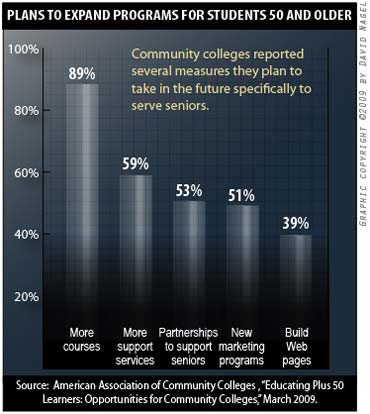Community Colleges Reach Out to Senior Learners
American community colleges are increasingly reaching out to seniors. What's more, they're planning to expand programs and services specifically aimed at students 50 and older, according to new research from the American Association of Community Colleges (AACC).
The report, "Educating Plus 50 Learners: Opportunities for Community Colleges," authored by the AACC's Plus 50 Initiative, showed that some 84 percent of community colleges offer programs targeted toward students 50 and older, and growth will continue. Ninety-three percent of colleges surveyed said they perceive a need for senior-focused programming. And this will translate to expanded course offerings and services targeted toward plus-50 students. According to the research:
- 89 percent of community colleges said they intend to offer more courses for students 50 and older in the future;
- 59 percent said they plan to offer more services to support plus-50 students;
- 53 percent will partner with other organizations to offer greater support;
- 51 percent will launch marketing campaigns specifically targeting senior students; and
- 39 percent will build Web content targeted toward students 50 and older.
Furthermore, technology is playing a role in colleges' attempts to reach out to older students. Thirty-nine percent reported offering assistive technology to support students with limited hearing and vision, and 38 percent are making an effort to support the "comfort and ease of the college-going experience," according to the report.
A full 62 percent of community colleges surveyed reported that they bring courses, workshops, and seminars to locations that are easy for seniors to reach, such as community centers that cater to seniors. Further, 59 percent said they will offer more support services for seniors in the future.
The research also showed that support services offerings were much stronger among institutions that have conducted needs-assessment surveys. Of those that have conducted such surveys:
- 91 percent bring courses, workshops, and seminars to locations that are easy for seniors to reach (compared with 52 percent among those that haven't conducted surveys);
- 82 percent offer computer training tailored for seniors (compared with 59 percent among colleges that haven't conducted surveys);
- 58 percent offer assistive technologies in classrooms (compared with 35 percent);
- 49 percent off Web content tailored for students 50 and older (compared with 23 percent); and
- 30 percent offer advising or counseling tailored specifically to plus-50 learners (compared with 13 percent).
"Community colleges have a long history of reaching out to non-traditional students and structuring programs to meet immediate community needs," said George R. Boggs, AACC President and CEO, in a statement released to coincide with the report. "It’s heartening to see so many colleges throwing a lifeline to plus 50 students coping with a difficult job market during distressing economic times."
The survey was conducted in fall 2008. It was sent out to every community college in the United States (more than 1,177 total), and 204 participated. Responses weighed more heavily toward larger community colleges.
Further information about the survey, including a complete report in PDF format, can be found here. An executive summary of the report can be downloaded in PDF format here.